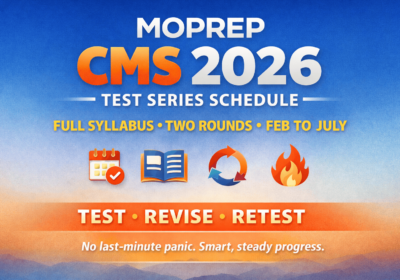Overview of the UPSC CMS Exam

he Union Public Service Commission (UPSC) conducts the Combined Medical Services (CMS) Exam every year to recruit medical officers for various central government departments and organizations, including railways, municipal corporations, and health services. The exam offers a prestigious career opportunity for medical professionals interested in government service, providing stability, ample growth opportunities, and a fulfilling role in public health.
Exam Structure and Eligibility
The UPSC CMS Exam is divided into two main parts: a Computer-Based Test (CBT) and a Personality Test.
- Computer-Based Test (CBT)
- Paper 1: General Medicine and Pediatrics (250 marks)
- Paper 2: Surgery, Gynecology & Obstetrics, and Preventive & Social Medicine (250 marks)
- Personality Test
- This is a structured interview conducted by UPSC, carrying 100 marks. It assesses candidates’ general knowledge, leadership potential, communication skills, and suitability for government service.
To be eligible for the UPSC CMS Exam, candidates must hold an MBBS degree from a recognized university. Additionally, applicants must be below 32 years of age, with specific age relaxations for reserved categories.
Key Topics and Syllabus Breakdown
The CMS Exam covers comprehensive medical knowledge across multiple disciplines. Here’s a brief breakdown:
- General Medicine and Pediatrics: Focuses on diagnostics, patient management, common illnesses, chronic conditions, and pediatric care.
- Surgery: Covers basics in general surgery, including essential procedures, trauma management, and minor surgical interventions.
- Gynecology & Obstetrics: Includes topics like maternal and fetal health, labor management, prenatal and postnatal care, and family planning.
- Preventive & Social Medicine: Emphasizes community health, epidemiology, vaccination, health education, and public health programs.
Preparation Strategy
- Understand the Syllabus: Review each subject’s specific topics to ensure targeted preparation.
- Practice Previous Year Papers: Solving past exam papers will familiarize you with the question format and improve time management.
- Focus on High-Yield Topics: Prioritize frequently tested areas such as emergency medicine, national health programs, and preventive healthcare.
- Mock Tests and Timed Practice: Regular practice under timed conditions helps improve accuracy and speed.
Job Profile and Career Progression
The UPSC CMS Exam leads to roles in government health departments, offering a stable career with defined progression paths. Depending on the department, CMS officers may work as Medical Officers, Junior Scale Officers, or in equivalent positions. The role involves preventive, promotive, and curative healthcare duties and administrative responsibilities, contributing directly to national health initiatives and policy implementation.
Conclusion
The UPSC CMS Exam is an excellent pathway for doctors looking to serve in the public sector. With a clear focus on healthcare delivery and an opportunity to impact community health at a national level, it provides a fulfilling career that blends medical expertise with public service. Preparing for the CMS Exam requires dedicated study and a strategic approach to cover the syllabus effectively, but the rewards in terms of job stability, social impact, and personal growth are well worth the effort.




Leave a Reply